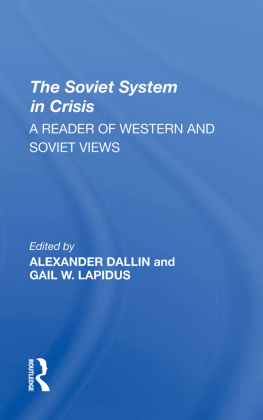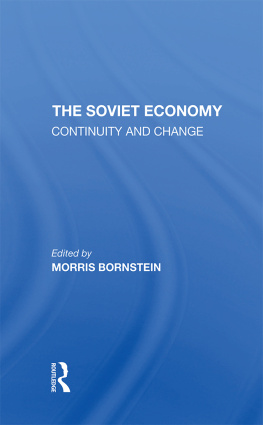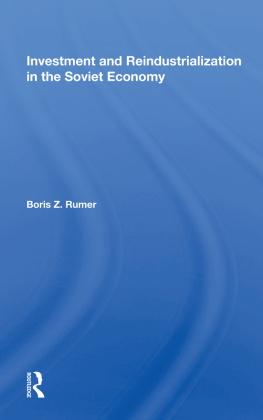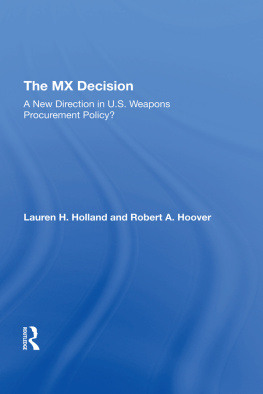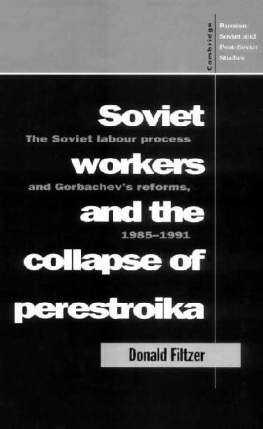The Future of the Soviet Economy: 19781985
Other Titles in This Series
Hungary: An Economic Geography, Gyrgy Enyedi
The Future of Agriculture in the Soviet Union and Eastern Europe: The 19761980 Five-Year Plans, edited by Roy D. Laird, Joseph Hajda, and Betty A. Laird
The Liberated Female: Life, Work, and Sex in Socialist Hungary, Ivan Volgyes and Nancy Volgyes
Population and Migration Trends in Eastern Europe, edited by Huey Louis Kostanick
A Case Study of a Soviet Republic: The Estonian SSR, edited by Ton Panning and Elmar Jarvesoo
Yugoslavia After Tito: Scenarios and Implications Gavriel D. Raanan
The Soviet Agrarian Debate: A Controversy in Social Science, 19231929, Susan Gross Solomon
The German Democratic Republic: A Developed Socialist Society, edited by Lyman H. Legters
Innovations in Communist Systems, edited by A. Gyorgy and Jim Kuhlman
Soviet Involvement in the Middle East: Policy Formation, 19661973, Ilana Kass
A Short History of the Hungarian Communist Party, Mikls Molnr
Westview Special Studies on the Soviet Union and Eastern Europe
The Future of the Soviet Economy: 19781985
edited by Holland Hunter
Where will the Soviet economy be heading in the 1980s? How is the economy likely to react to slowed growth in the labor force and increased pressure for supplies of energy and raw materials? This volume, growing out of papers prepared for the October 1977 national conference of the American Association for the Advancement of Slavic Studies, offers an integrated exposition of these issues. The authors use historical evidence and macroeconometric models of the Soviet economy as bases from which to view the future, assessing the possible results of the interaction between Soviet policy and potential developments.
Holland Hunter is professor of economics and chairman of the Economics Department at Haverford College. He is also senior consultant to the Strategic Studies Center of SRI-International. His analyses of the Soviet economy have appeared in numerous books and articles and in the compendia issued in 1959, 1966, 1969, and 1976 by the Joint Economic Committee of Congress on the Soviet economy.
First published 1978 by Westview Press
Published 2019 by Routledge
52 Vanderbilt Avenue, New York, NY 10017
2 Park Square, Milton Park, Abingdon, Oxon OX14 4RN
Routledge is an imprint of the Taylor & Francis Group, an informa business
Copyright 1978 Taylor & Francis
All rights reserved. No part of this book may be reprinted or reproduced or utilised in any form or by any electronic, mechanical, or other means, now known or hereafter invented, including photocopying and recording, or in any information storage or retrieval system, without permission in writing from the publishers.
Notice:
Product or corporate names may be trademarks or registered trademarks, and are used only for identification and explanation without intent to infringe.
Library of Congress Catalog Card Number: 78-7150
ISBN 13: 978-0-367-29238-6 (hbk)
Contents
- Holland Hunter
- F. Douglas Whitehouse and Daniel R. Kazmer
- Donald W. Green
- Barbara S. Severin and David W. Carey
- Daniel Gallik
- Philip Grossman
- Holland Hunter
This joint enterprise began as a session at the October 1977 national convention of the American Association for the Advancement of Slavic Studies. The panel discussion was organized under the leadership of John P. Hardt, Congressional Research Service, Library of Congress. The participants agreed to convert their compact reports into chapters in a book designed to provide a balanced evaluation of current prospects for the Soviet economy. Though all the authors carry heavy responsibilities in their respective organizations, they agreed to revise and augment their papers within three months. The Westview Press in turn offered unusually prompt production of a book using camera-ready copy. We thus sought to avoid the long delays that often afflict the published outcomes of scholarly meetings. Slight slippage in deadlines has enabled us to incorporate evidence up through the end of February, 1978.
The analysis in this book is based on primary evidence, mainly in published Soviet books and periodicals. Footnotes provide selected references at key points and also suggest a few supplementary or alternative treatments. The views expressed in the chapters represent the opinions of the respective authors and do not necessarily reflect the views of their organizations. Most of the referenced sources are readily available. Working papers relating to SOVMOD, the SRI-WEFA macroeconometric model of the Soviet economy, are available from SRI International, 1611 North Kent Street, Arlington, VA 22209. The cited reports issued by the Office of Economic Research, Central Intelligence Agency, are available from Photoduplication Service, Library of Congress, Washington, D.C. 20540.
As editor I acknowledge with gratitude the equanimity of the principal authors as they responded quite flexibly to suggestions for prompt changes. We are all especially grateful for the precision and craftsmanship displayed by Linda Langley in preparing the camera-ready copy.
Holland Hunter
1
Introduction
Holland Hunter
Haverford College
This book is an effort to assess the Soviet midterm economic future. Some will feel the effort itself is doubtful. Assessing the future is even harder than assessing the past. Prudence has traditionally suggested that one should wait for the dust to settle before evaluating complex situations. But todays decisions require judgments concerning prospective developments, and cautious decision makers can benefit from systematic efforts to review plausible future possibilities. It is in this spirit that the following analyses are offered.
Assessment of future possibilities is gaining in rigor as new techniques make it possible to ask and answer future-oriented questions with greater precision. The analyses in this book reflect the use of powerful new methods. They rest, first of all, on a painstakingly assembled base of quantitative evidence covering the last 20 years. They make use, secondly, of quantitative models of the Soviet economy. Disaggregated models of an economy, like those in this book, have several marked advantages:
- They enforce simultaneous attention to all major aspects of the interrelated stocks and flows of economic activity?
- They demand consistency among these parts as they evolve over time; and They permit experimentation: hypothetical changes can be introduced into the model, and their impact can be traced throughout the economy and into subsequent periods.
Economic modeling therefore provides an orderly framework in which to conduct cautious forays into the future. The forays are disciplined by the economys structural inheritance and
In this book we do not present single-valued predictions about the Soviet economic future. We offer instead a systematic preview of plausible outcomes generated by alternative possibilities over the next five or ten years. The possibilities are of two kinds. First there are the objective factors that will condition Soviet economic activity, such as the weather, the availability of fuels and raw materials, the size and composition of the population, and the structure of world trade. Alternative prospects here have been specified, and potential trends have been spelled out in some detail. Secondly, there are the behavioral responses that can be made by Soviet authorities, Soviet consumers, and all those engaged in Soviet economic activities. Here too the analyst can propose any number of well-specified assumptions and investigate the consequences for the economy if the responses occur.



